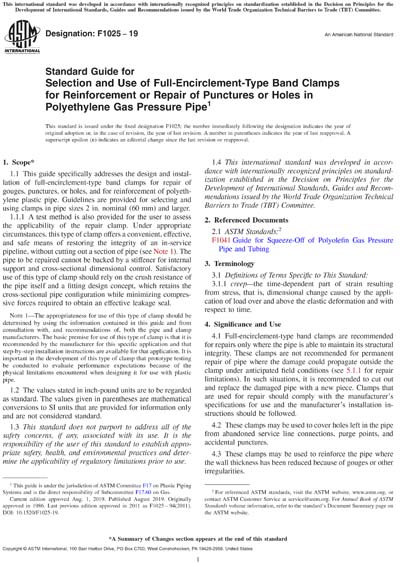Most recent
ASTM F1025-19
Standard Guide for Selection and Use of Full-Encirclement-Type Band Clamps for Reinforcement or Repair of Punctures or Holes in Polyethylene Gas Pressure Pipe
1.1 This guide specifically addresses the design and installation of full-encirclement-type band clamps for repair of gouges, punctures, or holes, and for reinforcement of polyethylene plastic pipe. Guidelines are provided for selecting and using clamps in pipe sizes 2 in. nominal (60 mm) and larger.
1.1.1 A test method is also provided for the user to assess the applicability of the repair clamp. Under appropriate circumstances, this type of clamp offers a convenient, effective, and safe means of restoring the integrity of an in-service pipeline, without cutting out a section of pipe (see Note 1). The pipe to be repaired cannot be backed by a stiffener for internal support and cross-sectional dimensional control. Satisfactory use of this type of clamp should rely on the crush resistance of the pipe itself and a fitting design concept, which retains the cross-sectional pipe configuration while minimizing compressive forces required to obtain an effective leakage seal.
Note 1: The appropriateness for use of this type of clamp should be determined by using the information contained in this guide and from consultation with, and recommendations of, both the pipe and clamp manufacturers. The basic premise for use of this type of clamp is that it is recommended by the manufacturer for this specific application and that step-by-step installation instructions are available for that application. It is important in the development of this type of clamp that prototype testing be conducted to evaluate performance expectations because of the physical limitations encountered when designing it for use with plastic pipe.
1.2 The values stated in inch-pound units are to be regarded as standard. The values given in parentheses are mathematical conversions to SI units that are provided for information only and are not considered standard.
1.3 This standard does not purport to address all of the safety concerns, if any, associated with its use. It is the responsibility of the user of this standard to establish appropriate safety, health, and environmental practices and determine the applicability of regulatory limitations prior to use.
1.4 This international standard was developed in accordance with internationally recognized principles on standardization established in the Decision on Principles for the Development of International Standards, Guides and Recommendations issued by the World Trade Organization Technical Barriers to Trade (TBT) Committee.
Content Provider
ASTM International [astm]






